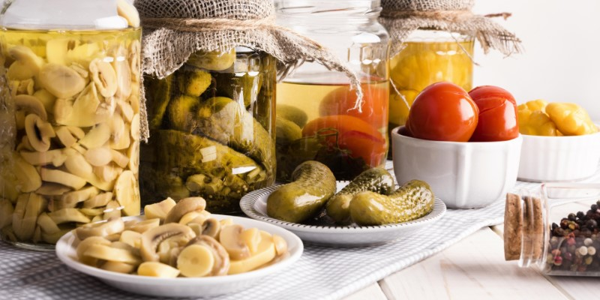Fermented foods have been part of human diets for thousands of years, but their resurgence in popularity is more than a passing trend. In today's world, they hold a unique place as both a culinary tradition and a modern health booster. From ancient preservation techniques to the latest wellness fads, fermented foods are finding their way into kitchens and diets around the globe. This article delves into the origins of fermentation, the science behind it, and how these age-old foods are making a comeback in the health-conscious world of 2024.
Fermentation is an ancient technique used to preserve food, enhance flavours, and improve nutrition. It has been integral to human history, influencing global cuisines and cultures. Passed down through generations, this natural process transforms ingredients into longer-lasting and flavorful staples, continuing to play a vital role today.
Fermentation is one of the oldest food preservation methods used by ancient civilizations like Mesopotamia, Egypt, and China. Before refrigeration, it was essential to extend the shelf life of perishable foods such as vegetables, milk, and fish, driven by necessity rather than scientific understanding.
Many common fermented foods, such as kimchi, sauerkraut, yoghurt, and miso, have ancient origins. Kimchi has been a Korean staple for over 2,000 years, sauerkraut dates back to ancient Rome, yoghurt originated in Central Asia, and miso has long been central to Japanese cuisine.
Fermentation played a crucial role in early societies by preserving surplus crops and proteins and ensuring food security during difficult times. It became deeply embedded in cultural traditions, rituals, and religious practices as foundational for developing stable, long-term food systems and thriving communities.

Fermentation is a natural process where microorganisms break down sugars, creating alcohol, acids, and gases. This enhances food preservation, flavour, texture, and nutrition in bread, yoghurt, and beer.
Fermentation is a metabolic process that transforms sugars and carbohydrates into alcohol or acids using microorganisms like bacteria, yeast, or fungi. This alters the food's chemistry, enhancing flavour, texture, and digestibility while making nutrients more accessible. It offers health benefits historically valued in various cultures.
Fermentation uses microbes like Lactobacillus bacteria to break down food components. In vegetables, these bacteria consume sugars and produce lactic acid, creating an acidic environment that preserves the food and gives it a tangy flavour, as seen in sauerkraut and pickles.
Fermentation enhances nutrition by introducing probiotics, which support gut health, improve digestion, boost immunity, and influence mental well-being. It also increases the bioavailability of nutrients like B vitamins, iron, and zinc, making fermented foods nutritionally rich and beneficial for overall health.

Modern fermented foods have gained renewed popularity for their health benefits, particularly in supporting gut health, digestion, and overall well-being. They are becoming a vital part of health-conscious lifestyles.
In the past decade, fermented foods like kombucha, kefir, and kimchi have gained popularity for their potential health benefits, particularly for the gut and microbiome. Health-conscious communities embrace these functional foods to promote wellness and address digestive issues and inflammation.
Kombucha and kefir are ancient fermented beverages, kombucha from China and the Caucasus. They are now famous for their probiotics and refreshing taste. Kombucha is fizzy and tart, while kefir is creamy and tangy. Both are valued for their health benefits and modern appeal.

The rise of plant-based diets has boosted the popularity of fermented foods like tempeh, kimchi, and sauerkraut. Tempeh, a protein-rich Indonesian soybean product, and fermented vegetables are favoured for their nutrient-dense, low-calorie profiles, appealing to health-conscious vegans and vegetarians.
Chefs worldwide are embracing fermentation to create innovative dishes with enhanced flavours. Fermented ingredients like miso, soy sauce, and fish sauce add umami, a savoury fifth taste. Modern chefs also experimented with fermented grains, fruits, and meats, adding depth and complexity to their culinary creations.

Incorporating fermented foods like kimchi and miso into your diet enhances flavour and nutrition, improves digestion with probiotics, and adds a unique depth to everyday meals.
Incorporating fermented foods into your daily diet doesn't have to be complicated. Many fermented products are available in grocery stores and markets, and it's easy to begin with familiar options like yoghurt, kefir, or pickles. Adding a serving of these foods to your meals can offer a range of health benefits, from improved digestion to enhanced nutrient absorption.
Making your fermented foods home is simple and rewarding, especially for beginners. You can control the ingredients and flavour with vegetables, salt, water, and time. Homemade ferments are often cheaper and more eco-friendly than store-bought alternatives.
While fermented foods can be a valuable addition to any diet, it's essential to maintain a balanced approach. Too much of a good thing can sometimes lead to digestive discomfort, especially for those new to fermented foods. Start with small portions and gradually increase your intake as your body adjusts. Variety is essential, so aim to incorporate a wide range of fermented products to reap the full benefits.
Incorporating fermented foods into your diet can play a role in addressing modern health concerns, such as gut health, inflammation, and immunity. As more research is conducted on the microbiome, the benefits of probiotics in fermented foods are becoming more apparent. By regularly consuming fermented foods, you can support a healthy gut, which can impact everything from digestion to mental clarity.

Fermented foods are a fascinating blend of ancient wisdom and modern health trends. They've moved from being a necessity for food preservation to becoming a staple in wellness diets across the globe. Whether you're sipping on kombucha, enjoying a spoonful of yoghurt, or experimenting with homemade sauerkraut, these time-tested foods offer a wealth of benefits. By understanding the history, science, and modern applications of fermentation, you can take part in this growing movement and incorporate these powerful foods into your daily routine.